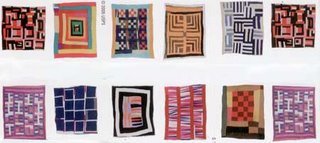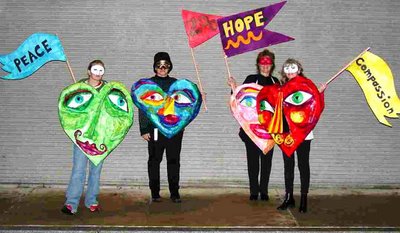
I can't seem to escape this meme of five strange things about me. White African tagged me. People are strange and I suspect I've got "strange" in spades, but for some reason am at a loss to figure out how to play this game.
Yesterday was my fifty-first birthday and a good friend was nice enough to have me and my father over for dinner with some friends. I was pleased to take some of my new hat designs to show them around.
Readers of this blog may recall that I think party hats are a good way to raise money. In my experiments with this hypothesis, the data just don't support it. Still I persist. Paper hats have a good thing going for them, they are very cheap to make and they seem to have some value.
In October I followed a proposal making process at Omidyar.net where the Omidyar Foundation was making money available for five proposals generated by member-teams at Omidyar.net. The proposals were selected for funding by votes from Omidyar.net members. I was particularly interested in the WDI--Attacking Water Borne Diarrheal Illnesses proposal. And it was a shock when the WDI proposal wasn't selected for funding. Of course all of the proposals were great, because in each target area the Omidyar member groups vetted and then selected non-profits in the field doing good work. The Omidyar Foundation was so impressed with the quality of the proposals that they have offered to match dollar for dollar donations to the organizations up to $12,500--that's up to $2500 for each of the five organizations identified in each of the target area proposals.
So out came my hats and my perseverating notion that paper party hats are a good way to raise money and awareness about good projects. Hats for Health is a little known and strange result. In the picture you can see a friend wearing one of my newspaper hats.
Okay, so having grandiose ideas that thousands of people will take up making paper party hats to raise money to combat water-borne diarrheal illness is just one strange fact about me.
In my last post, I complained that I had missed the point and started writing my mini-biography around five facts about me. Thinking the better of it I deleted most of the verbiage and simply listed the five things:
1. I'm a Southerner.For today's post I'll copy in what I wrote for numbers 1-3. Surely there are more than five strange things about me in all of it.
2. I used to be a charismatic Christian.
3. I flunked out of university.
4. I love Trudy.
5. I'm a mama's boy.
I talk too much. If there are little-know facts about me they're probably little-known because I wore out people from talking too much.
1. I'm Southern. I was born in the mountains of Virginia. My parents were both born in Massachusetts and I was the only one of five children born below the Mason Dixon Line. As it turns out I don't think that's really a fact as three of the kids were born in Cumberland, Maryland but some arcane dispute was conjured up to suggest that the hospital where they were born was actually north of the Mason Dixon Line. There was no disputing that Virgina is most decidedly South, so I was often called their "Rebel child." Readers outside the USA might wonder why a line that established boundaries would be so important. I wondered the same all my life and it's drawn my attention to the ethos of America North and South.
2. I used to be a charismatic Christian. In 1964 our family moved to Greenville, South Carolina from Cumberland, Maryland. I was in fourth-grade. First thing, I got beat up for being a damnyankee. This Southern stuff was hard to figure. And you might note that 1964 places me in the South during the Civil Rights Movement. We moved there just before the signing of The Civil Rights Act of 1964. What it meant to be a Southerner was something I wanted to understand very much. A Change Is Gonna Come is a big part of what it means to me. Religiosity is another part of it. I went to an Episcopal school, Christ Church in Greenville. Religious education was one of the few subjects where I excelled.
Then for my ninth and tenth grades in school we moved to Charlotte, North Carolina, where I attended public schools. Just in time for perhaps the most contentious school desegregation plan in the country. We moved in the summer of 1968. For the 1969-1970 school year Charlotte schools were under the new school busing orders and there were protests and security at my first year in senior high. Those years were also years of drugs and rock music. I had received a bit of marijuana, some bright pink rolling papers and a couple of hits of blotter LSD in the school cafeteria. On the bus I rode was a long-haired hippie, a Jesus Freak. The day I got my stash I sat next to him. Part of my being so receptive to his pitch was I was looking for a reason not to play with drugs.
I started going to religious services on Wednesday nights. They were far different from my relatively high-Church Episcopal background with frenzied prayers, fervent singing and speaking in tongues. In addition the meetings kept me out far too late on a school night.
3. I flunked out of college. We moved from Charlotte to Pittsburgh in the summer of 1970. We lived in the suburbs but could take the trolley into the city. It was wonderful for me and my brother to be able to enjoy the cultural institutions of an urban environment. In high school I continued carry my black Bible but my Humanities course introduced me to Western civilization, art, music and philosophy. And for whatever reasons I was able to read fiction really for the first time. I'm not sure but it was like a switch that got turned on; whereas before I had a hard time ever finishing a book I just couldn't seem to get enough. But when it came time to choose a college, I hadn't a clue. I was accepted at the University of Pittsburgh and began attending.
I was a poor student. I had a hard time concentrating. My religious devotion had taken a detour during my final two years of high school. There was nothing like the charismatic Full Gospel group like what I had been into in Charlotte. Plenty of very conservative Christian youth groups were around. And from participation in those groups I got an exposure to a more systematic theology. Pittsburgh was a much more culturally diverse setting too from my Southern background. I took Philosophy courses at attending Pitt. So towards the end of my first semester I had a "crisis of faith" and put my religious certainty in abeyance. Being easily distracted might not have been enough to make me fail in college, but by the second semester of my sophomore year I discovered "partying" and that was the death knell for my academic career.
I was, however very earnestly looking for answers. Five books I discovered in college were especially important to me in finding approaches to answers which made sense to me:
Values and Teaching by Louis E. Raths. This 1965 book is still available but isn't in print. The seven criteria of a value helped me to understand a process for valuing.
Steps to an ecology of Mind by Gregory Bateson.
Design for the Real World by Victor Papanek.
The Oregon Experiment by Christopher Alexander, et al. I eagerly read other books by Alexander, but this was my first and it had a big impact on my thinking about how democracy could function and why democracy so often falls short as a result of structural assumptions.
The Whole Earth Epilog. I didn't find out about Bateson from the Whole Earth Epilog, nor really about Christopher Alexander but the Epilog helped me to make connections with other fields of study and cultural trends.
There were so many books, but these five were especially influential in finding a way to think about things. Very early on in my freshman year I read Chance and Necessity. I did so because a very conservative Christian author, Francis Shaffer railed against Monad's atheism. I suspect reading the book was a symptom and not a cause of my "crisis of faith." In a conservative Christian view the world was made by God. Shaffer wasn't having any part of Monad's evolutionary perspective where chance plays a crucial part. Reading Monad's book drew my attention to many areas where I was finding my narrow view of Christianity in conflict with the way things really are. Perhaps "context" is a common thread my pick of the five most important books for me in college and with that a change from imaging a universe created to imagine a universe in creation.
I truly doubt I know anyone, much less five bloggers, to take up this meme. Last post I did list five. For the heck of it I'll add Potash just because I think he could do something funny with this meme. I'll even write to him so he'll know he's been tagged. Let Them Talk is great new video blog featuring one of my best friends, Miss Joan Marie Moossy.
Have a Merry Christmas and Happy New Year!












